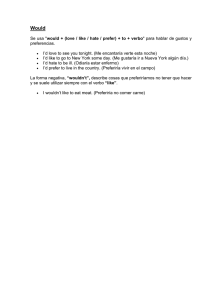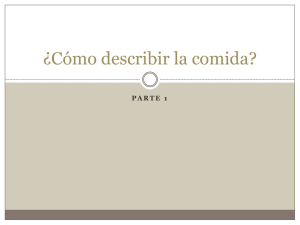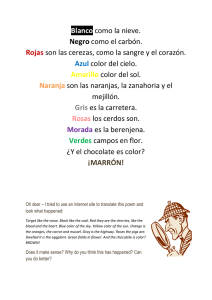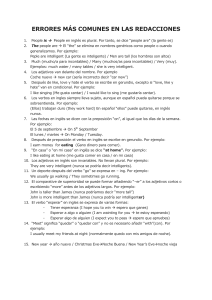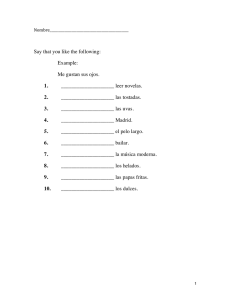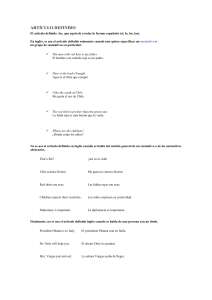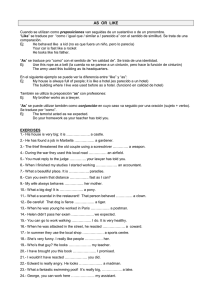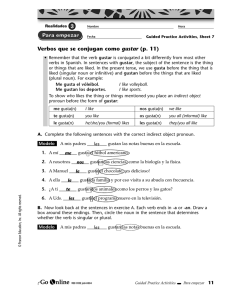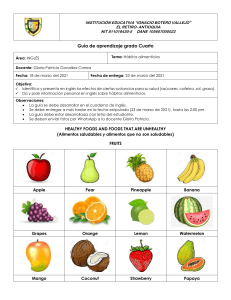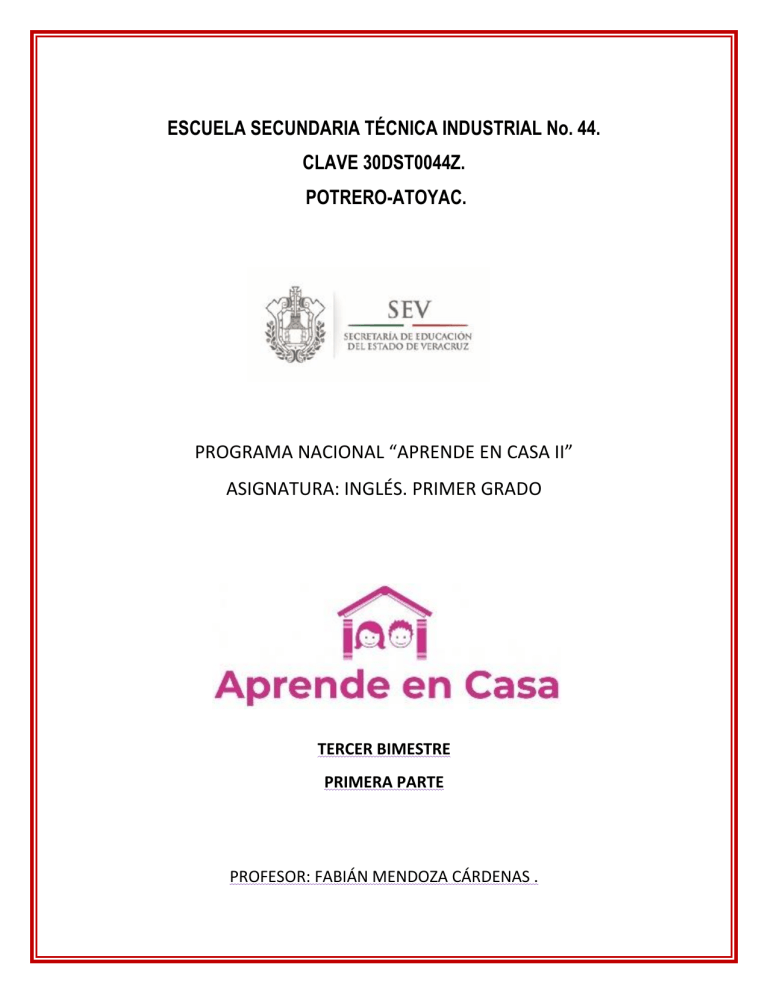
ESCUELA SECUNDARIA TÉCNICA INDUSTRIAL No. 44. CLAVE 30DST0044Z. POTRERO-ATOYAC. PROGRAMA NACIONAL “APRENDE EN CASA II” ASIGNATURA: INGLÉS. PRIMER GRADO TERCER BIMESTRE PRIMERA PARTE PROFESOR: FABIÁN MENDOZA CÁRDENAS . Expressing likes and dislikes Expresar gustos y disgustos LIKE GUSTAR LIKE = similar to; the same as. LIKE = similar a; lo mismo que. There are three different structures to make a sentence with this verb: Hay tres estructuras diferentes para hacer una oración con este verbo: VERB + LIKE + NOUN / PRONOUN. VERB + LIKE + NOUN / PRONOUN. I like soccer – Me gusta el fútbol. I like soccer – Me gusta el fútbol. VERB + LIKE + TO + VERB VERB + LIKE + TO VERB I like to listen to music. I like to listen to music. VERB + LIKE + VERB + ING VERB + LIKE + VERB + ING I like listening to music. I like listening to music. Examples: Ejemplos: VERB + LIKE + NOUN / PRONOUN. VERBO + GUSTAR + SUST. / PRON. I like apples. Me gustan las manzanas. You like Mónica. Te gusta Mónica. He likes cars. A él le gustan los autos. They like the movies A ellos les gusta el cine VERB + LIKE + TO + VERB VERBO + GUSTAR + TO + VERBO I like to eat apples. Me gusta comer manzanas. You like to see Mónica. Te gusta ver a Mónica. He likes to drive cars. A él le gusta manejar autos. They like to watch movies A ellos les gusta ver películas. VERB + LIKE + VERB + ING VERBO + GUSTAR + VERBO + ING I like eating apples. Me gusta comer manzanas. You like seeing Mónica. Te gusta ver a Mónica. He likes driving cars. A él le gusta manejar autos. They like watching movies A ellos les gusta ver películas. DON’T/DOESN’T LIKE NO GUSTAR VERB + DON’T/DOESN’T + LIKE + NOUN / PRONOUN. VERBO + NO + GUSTAR + SUST / PRON. I like soccer – Me gusta el fútbol. I like soccer – Me gusta el fútbol. VERB + DON’T/DOESN’T + LIKE + TO + VERB VERBO + NO + GUSTAR + TO + VERBO I like to listen to music. I like to listen to music. VERB + DON’T/DOESN’T + LIKE + VERB + ING VERBO + NO + GUSTAR + VERBO + ING I like listening to music. I like listening to music. Examples: Ejemplos: VERB + DON’T/DOESN’T + LIKE + NOUN / PRONOUN. VERBO + NO + GUSTAR + SUST / PRON. I don’t like mosquitoes – No me gustan los mosquitos. No me gustan los mosquitos. She doesn’t like the heat. – A ella no le gusta el calor. A ella no le gusta el calor. VERB + DON’T/DOESN’T + LIKE + TO + VERB VERBO + NO + GUSTAR + TO + VERBO I don’t like to play golf No me gusta jugar golf. I don’t like to dance cumbia songs. No me gusta bailar canciones de cumbia. Many people don’t like to stay home. A mucha gente no le gusta quedarse en casa. My mother doesn’t like to cook. A mi madre no le gusta cocinar VERB + DON’T/DOESN’T + LIKE + VERB + ING VERB + NO + LIKE + VERBO + ING I don’t like playing golf – No me gusta jugar golf. I don’t like dancing cumbia songs. No me gusta bailar canciones de cumbia. Many people don’t like staying home. casa. A mucha gente no le gusta quedarse en casa. My mother doesn’t like cooking. A mi madre no le gusta cocinar. I don’t like = I dislike No me gusta – Me disgusta QUESTIONS WITH LIKE Preguntas con “gustar” SIMPLE QUESTIONS Preguntas SIMPLEs DO/DOES + 😊 + LIKE + NOUN / PRONOUN + COMP? ¿DO/DOES + 😊 + GUSTAR + SUST / PRON + COMP? Do you like oranges? ¿Te gustan las naranjas? Yes, I do. / no, I don’t – Sí. / No. Sí. / No. DO/DOES + 😊 + LIKE + TO + VERB + COMP? ¿DO/DOES + 😊 + GUSTAR + TO + VERBO + COMP? Does he like to play the piano? ¿Le gusta tocar el piano? Yes, he does. / No, he doesn’t Sí. / No. DO/DOES + 😊 + LIKE + VERB + ING + COMP? ¿DO/DOES + 😊 + GUSTAR + VERBO + ING + COMP? I like listening to music. Me gusta escuchar música. Examples: Ejemplos: DO/DOES + 😊 + LIKE + NOUN / PRONOUN + COMP? ¿DO/DOES + 😊 + GUSTAR + SUST / PRON + COMP? Do you like English? ¿Te gusta el inglés? Yes, I do. / No, I don’t. Sí. / No. Does Martha like classical music? ¿A Martha le gusta la música clásica? Yes, she does. / No, she doesn’t. Sí. / No. DO/DOES + 😊 + LIKE + TO + VERB + COMP? DO / DOES + 😊 + LIKE + TO + VERBO + COMP? Do you like to study? ¿Te gusta estudiar? Yes, I do. / No, I don’t. Sí. / No. Does Peter like to drink orange juice? ¿A Peter le gusta beber jugo de naranja? Yes, he does. / No, he doesn’t Sí. / No. DO/DOES + 😊 + LIKE + VERB + ING + COMP? DO / DOES + 😊 + LIKE + VERBO + ING + COMP? Do you really like being a teacher? ¿De verdad te gusta ser profesor? Yes, I do. / No, I don’t Sí. / No. Does Peter like drinking orange juice? ¿A Peter le gusta beber jugo de naranja? Yes, he does. / No, he doesn’t. Sí. / No. WH - QUESTIONS WH - PREGUNTAS WH- Q + DO/DOES + 😊 + LIKE + NOUN / PRONOUN + COMP? ¿WH- Q + DO / DOES + 😊 + LIKE + SUSTANTIVO / PRONOUN + COMP? Do you like oranges? ¿Te gustan las naranjas? Yes, I do. / no, I don’t – Sí. / No. Sí. / No. WH-Q + DO/DOES + 😊 + LIKE + TO + VERB + COMP? ¿WH-Q + DO / DOES + 😊 + LIKE + TO + VERBO + COMP? What does he like to play? ¿Qué le gusta jugar a él? He likes to play the piano A él le gusta tocar el piano WH - Q + DO/DOES + 😊 + LIKE + VERB + ING + COMP? ¿WH - Q + DO / DOES + 😊 + LIKE + VERBO + ING + COMP? What music do you like listening to? ¿Qué música te gusta escuchar? I like listening to rap music. Me gusta escuchar rap. Examples: Ejemplos: WH – Q + DO/DOES + 😊 + LIKE + NOUN / PRONOUN + COMP? ¿WH - Q + DO / DOES + 😊 + GUSTAR + SUST / PRON + COMP? Which subject do you like? ¿Qué materia te gusta? I like English. Me gusta el inglés. What kind of music does Martha like? ¿Qué tipo de música le gusta a Martha? She likes classical music. A ella le gusta la música clásica. WH- Q + DO/DOES + 😊 + LIKE + TO + VERB + COMP? What language do you like to study? I like to study English What does Peter like to drink? He likes to drink orange juice. WH - + DO/DOES + 😊 + LIKE + VERB + ING + COMP? What language do you like studying? I like studying English. What does Peter like drinking? He likes drinking orange juice. ¿WH- Q + DO / DOES + 😊 + GUSTAR + TO + VERBO + COMP? ¿Qué idioma te gusta estudiar? Me gusta estudiar inglés ¿Qué le gusta beber a Peter? A él le gusta beber jugo de naranja. ¿WH - + DO / DOES + 😊 + GUSTAR + VERBO + ING + COMP? ¿Qué idioma te gusta estudiar? Me gusta estudiar inglés. ¿Qué le gusta beber a Peter? A él le gusta beber jugo de naranja. The verbs LOVE and HATE work in the same way as the verb LIKE. Los verbos AMAR y ODIAR funcionan de la misma manera que el verbo GUSTAR. LOVE AMAR I love historical places. Amo los lugares históricos. I love to find historical places. Me encanta encontrar lugares históricos. I love to finding historical places. Me encanta encontrar lugares históricos. Michael loves History books. Michael ama los libros de historia. Michael loves to read History books. A Michael le encanta leer libros de historia. Michael loves reading History books. A Michael le encanta leer libros de historia. Most people love the city. La mayoría de la gente ama la ciudad. Most people love to be in the city. A la mayoría de la gente le encanta estar en la ciudad. Most people love being in the city. A la mayoría de la gente le encanta estar en la ciudad. Most people love breakfast. A la mayoría de la gente le encanta el desayuno. Most people love to have breakfast. A la mayoría de la gente le encanta desayunar. Most people love having breakfast. A la mayoría de la gente le encanta desayunar. hate odiAR I hate this place. Odio este lugar. I hate to be in this place. Odio estar en este lugar. I hate being in this place. Odio estar en este lugar. She hates the heat. Odia el calor. She hates to be hot. Odia estar caliente. She hates being hot. Odia estar caliente. Many people hate their jobs. Mucha gente odia su trabajo. Many people hate to work. Mucha gente odia trabajar. Many people hate working. Mucha gente odia trabajar. Many people hate banda music. Mucha gente odia la música de banda. Many people hate to listen to banda music. Mucha gente odia escuchar música de banda. Many people hate listening to banda music. Mucha gente odia escuchar música de banda. Verbs = Sing – Dance – Talk Verbos = Cantar - Bailar - Hablar Like 1. Read and find. Find the activities and write them in the boxes. Every day I have lots of things to do. I like going to school, and I love seeing my friends. I don’t like doing my homework and I hate practicing the piano! Weekends are great because I really like sleeping late but I don’t like tidying my room – I have to do this if my mom says so! going to school We can use like, love, hate, and don’t like to talk about how we feel about an activity. 2. Match them up! Match the verbs and the faces. I like I don’t like I love I really like I hate I really don’t like 3. Fill it in! Write the missing words in the sentenc es. Use the verbs on the right. watching a. I love b. I don’t like c. I like d. I don’t mind e. I hate watch TV. the car. wash computer games. play books. in a plane. read fly 4. Make it right! Find the mistake, underline it and write it correctly. a. I love play football. b. I no like study Maths. c. I really liking use the computer. d. He doesn’t like do his homework. e. They like watch films. playing PRESENT CONTINUOUS FORM PARA FORMAR EL PRESENTE CONTINUO SE UTILIZA EL VERBO AUXILIAR "TO BE" Y EL GERUNDIO (INFINITIVO + "-ING") DEL VERBO. Sujeto I He, She, It You, We, They Auxiliar (to be) Gerundio am talking, eating, learning, doing, going... is talking, eating, learning, doing, going... are talking, eating, learning, doing, going... STRUCTURE Affirmative Sentences + EXAMPLES: I'm talking. (Estoy hablando.) verbo auxiliar ("to be") He's eating. (Está comiendo.) + gerundio ("ing"). They're learning. (Están aprendiendo.) STRUCTURE Negative Sentences verbo auxiliar ("to be") + auxiliar negativo ("not") + gerundio ("-ing") EXAMPLES: I'm not talking. (No estoy hablando.) He's not [He isn't] eating. (No está comiendo.) They're not [They aren't] learning. (No están aprendiendo.) STRUCTURE Interrogative Sentences Verbo auxiliar ("to be") + EXAMPLES: Are you talking? (¿Estás hablando?) Is he eating? (¿Está comiendo?) + gerundio ("-ing")? Are they learning? (¿Están aprendiendo?) USES El presente continuo se utiliza para hablar sobre algo que está pasando en el momento en el que hablamos. Expresiones de tiempo tales como "now", "right now" and "at the moment" indican el presente continuo. Examples: I'm studying now. (Estoy estudiando ahora.) He's eating at the moment. (Está comiendo en este momento.) Is it raining? (¿Está lloviendo?) USES También lo usamos para hablar de algo que está sucediendo en la actualidad pero no necesariamente cuando hablamos. En este caso, se utilizan expresiones de tiempo como "currently", "lately" o "these days". Examples: They're learning English. (Están aprendiendo inglés.) She's currently looking for a job. (Actualmente está buscando un trabajo.) Are you working much lately? (¿Estás trabajando mucho últimamente?) USES Usamos el presente continuo para hablar de algo que está ya decidido que se hará en el futuro próximo. Su uso indica que es bastante seguro que lo planificado sucederá. Examples: I'm going to the party tonight. (Voy a la fiesta esta noche.) He's not [He isn't] coming to class tomorrow. (No viene a la clase manaña.) Are you working next week? (¿Trabajas la semana que viene?) NOTA: HAY ALGUNOS VERBOS QUE NO SOLEMOS USAR EN LOS TIEMPOS CONTINUOS EXAMPLES: BE WANT NEED KNOW PREFER REMEMBER UNDERSTAND CARE SEE HEAR SMELL BELIEVE BELONG COST SEEM EXIST OWN LIKE DISLIKE LOVE HATE FEAR ENVY MORE… LOS VERBOS QUE TERMINEN EN -E SE ELIMINA DICHA LETRA Y SE AGREGA –ING EJ: COME – COMING / LIVE – LIVING LOS VERBOS QUE TIENEN LA COMBINACIÓN –IE, SE ELIMINAN LAS LETRAS –IE PARA DESPUÉS AGREGAR -ING. EJ: DIE – DYING / LIE - LYING LOS VERBOS QUE TIENEN LA COMBINACIÓN CONSONANTE – VOCAL – CONSONANTE, SE REPITE LA ÚLTIMA CONSONANTE Y SE AGREGA – ING. EJ: RUN – RUNNING / SIT - SITTING PRESENT CONTINUOUS 1. Write the –ING FORM of these verbs. Break ......................................... Clean ......................................... Wash ......................................... Live ......................................... Play ......................................... 2. Fill in the blanks with the verbs in the present continuous tense (Affirmative) 1. John and I ...................................... (stay) in a beautiful hotel. 2. Kevin .......................................... (work) at home today. 3. I ...................................... (wait) for a very important letter. 4. You ...................................... (walk) too fast. 5. We ........................................... (plan) our next holiday. 3. Write the sentences in the negative. Use the present continuous 1. They .......................................... (buy) a new car. 2. He ............................................... (learn) to read. 3. I .................................................. ( look) for your keys. 4. We ............................................... (sell) the house. 5. They ........................................ (drink) tea. 4. A) 1. 2. 3. 4. 5. Write the questions. Use the present continuous What /Jessica / do? ......................................... Why / John and Patrick / laugh? ......................................... What book / you / read? ......................................... What / we / watch? ......................................... Where / they / stay? .........................................
